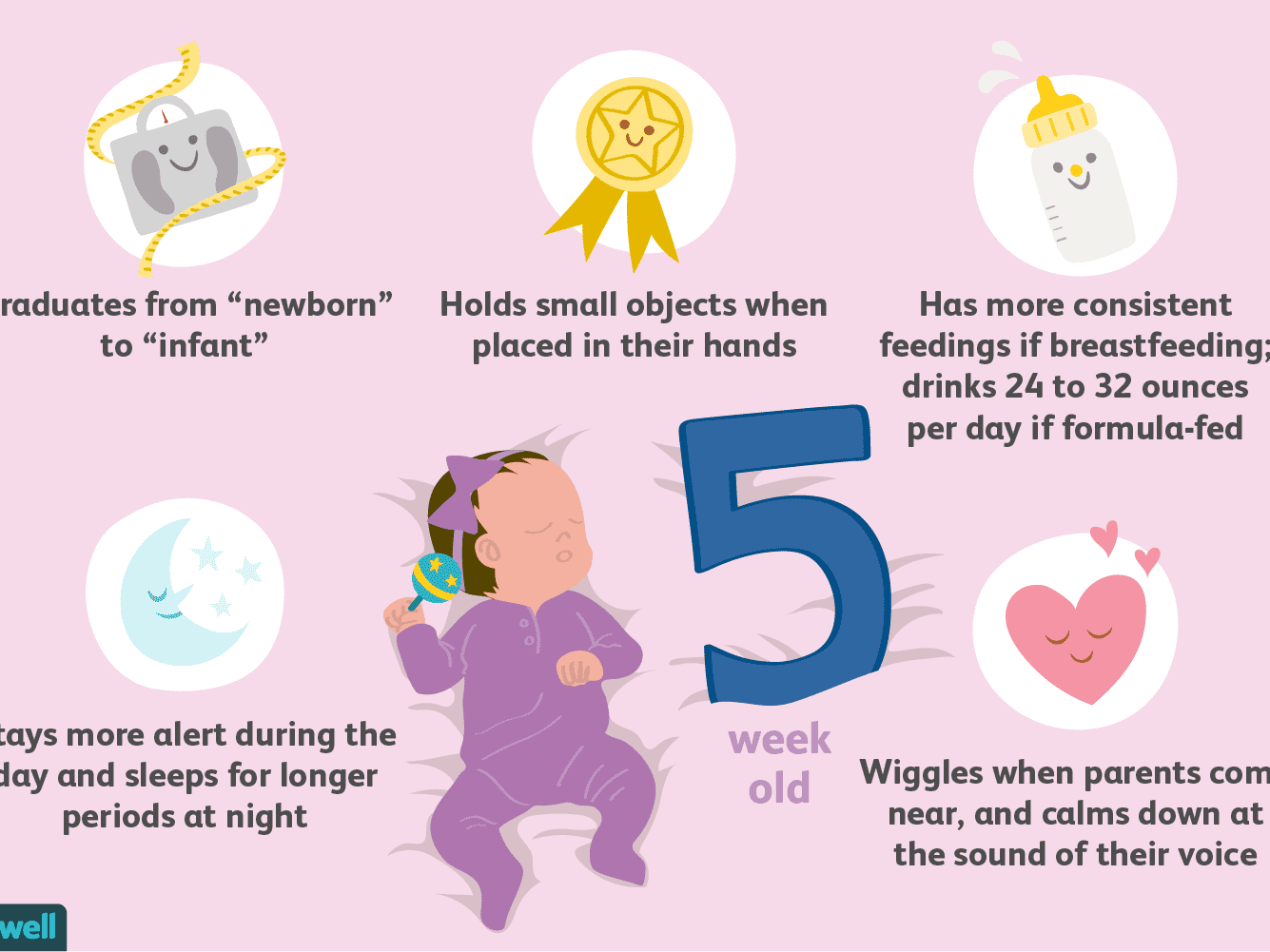How Much Should A 5 Month Old Weigh? A person’s weight indicates a healthy diet and physical growth. Therefore, being aware of babies’ monthly average weight can be beneficial.
In the beginning, it’s worth noting that average weight isn’t “normal” weight. As with adults, infants are available in all sizes and shapes.
Suppose the weight of a baby is lower than the percentile. It doesn’t necessarily mean an issue in their physical or growth Development.
In this regard, having a weight chart can aid in tracking their child’s growth.
5-Month-Old Baby Milestones
At 5 months, your baby will likely be “in-between” major milestones like standing on his feet and getting ready to walk.
The following month, 6 months old, marks an essential shift in Development.

You might observe that your baby is getting ahead in certain areas. But not other ones, which is fine! This month is about gaining skills and growing in size.
And you’ll likely seem like your baby can complete certain milestones in hours, but others will take longer.
Babies develop in their own way. And while it’s essential to keep track of major developmental milestones. So that you can speak to your doctor if you have concerns.
However, it’s essential to be mindful of allowing your child to explore and learn at their speed.
After five months, your baby will most likely be able to master the following:
- “Baby talk” and laughing
- Displays expression when “talking.”
- Different cries to express pain, hunger, or fatigue
- Grab toys using one hand
- Recognizes familiar faces and objects at a distance like a pet. A favorite toy or even a bottle
- Are you starting to sit up without assistance? (You might want to keep someone nearby to stop any unsteady falls!)
- Rolling back and forth from the stomach
- It might be pushing hands up or knees and “rocking.”
- That tiny personality shines through!
Five months is when babies suddenly learn skills you didn’t anticipate. Such as the ability to roll over or scoot, so be extra cautious this month to ensure you don’t leave your child at home on a bed or an elevated surface.
Such as the changing table, as they can begin to move within a matter of seconds.
Although you won’t be visiting your doctor until after your baby’s six-month examination, you should contact your doctor to discuss your next steps if there are any concerns regarding your baby’s growth.
How Much Should A 5-Month-Old Baby Weigh?
Based on the WHO’s charts for infant growth. The average weight of five-month-old girls is just a little over 15 pounds. Boys can weigh about 15 and 1/2 pounds.
Each month, your child grows by an average of an entire pound. Impressive, right?

But each baby develops differently, and your growth chart is the best measure of your baby’s Development.
It is to measure with the chart that your doctor will keep track of during their check-ups for well-child health.
What Should a Baby of 5 Months Take in?
According to the American Academy of Pediatrics, your baby should drink between 6-8 ounces every 4 hours during the daytime at five months. If you’re formula-feeding and feeding the baby milk from the breast, you could drink more at night than a formula-fed baby.
This is because the milk from the breasts is digested more thoroughly. Formula-fed babies cannot consume more significantly than 32oz all day.
If you are nursing your baby, it is essential to continue nursing. Be aware that your baby will likely help more frequently when the baby is growing.
The next phase of growth that your baby will likely undergo will be at around 6 months. However, babies might experience this growth quite early.
5-Month-Old Development
Your 5-month-old is developing various skills that’ll help get things accomplished. And they’re trying to grow more prominent as well.
Loss of weight in the newborn
Every child has an upward growth path from the time of birth. The first thing they do is lose weight! This is especially common among breastfeeding babies.
Babies may lose as much as 10 percent of their weight within the first few days.

But they should have regained it by the time they reach 10. It is usual for babies to lose some weight in the first few days following birth.
This is because they were born with some extra fluid that quickly disappears!
The newborns are also more likely to shed weight because it takes your baby a while to drink milk. Moreover, If you’re breastfeeding, your body must also learn to produce milk.
How Often Do You Need To Weigh Your Baby?
It’s easy to become obsessed with your baby’s weight at first. But after two weeks of your baby’s birth, there is no need to weigh your newborn this often.
In general, weigh your baby at the following times:
- Every month, for up to six months old
- Every 2 months between 6 to 12 months of age
- Each time for three months older than one
Naturally, you can take your newborn’s weight as frequently as possible without waiting for your next appointment.
You can visit the local clinic for babies or see your healthcare professional anytime.
However, your midwife is likely to take your infant’s weight more frequently if they are concerned about your child’s Development.
How Do You Record The Baby’s Weight?
At the final stages of your pregnancy or shortly after giving birth. Your midwife or doctor will hand you a small red book. This is your baby’s private medical record for your child (PCHR).
It’s not as terrifying as it might sound!

It is recommended to use this book to track your child’s body weight as well as height. Many parents also prefer keeping an account of their child’s vaccinations and illnesses.
But the red book must be up-to-date on your baby’s weight and height fluctuations.
It’s an excellent method of keeping track of your child’s progress, so ensure you take it to the infant clinic or visit your doctor.
It’s constructive and an excellent record to review as your child grows old enough to be a grown-up.
Percentile Of Baby Weight
In the book you keep in your pocket, you’ll note your baby’s weight and Development on the centile chart. These charts depict the growth and Development patterns of healthy girls and boys.
If your baby is large or tiny, you can expect them to add weight steadily within the same range shown on the centile chart. But even if your child is on the chart’s upper or lower end.
It doesn’t mean they’re overweight or overweight.
The graphs for baby weight percentiles may appear a bit daunting initially. But don’t fret.
The health professional will be able to teach you how to keep track of your child’s growth.
Your baby’s growth chart may not appear like other babies or your sister’s or brother’s.
You should visit your regular baby clinic and bring your red book.
Your baby’s Development and health are closely monitored, and your healthcare provider will help you with any queries or concerns that you may have.
What Factors Affect the Weight of a Newborn?
It is crucial not to focus only on a baby’s weight as the sole measurement of physical growth.
Other growth indicators include the baby’s size and the circumference of their heads.
The three measurements together give doctors an idea of the baby’s growth.
It gives growth ideas compared to babies of the same age and gender.
Keeping other developmental milestones in mind is crucial if you want more details on what factors affect a newborn’s body weight and size.
There are a variety of factors in play, including:
Sex
Male newborns are typically larger than females and usually gain weight more quickly during infancy.
Nutrition
The infant’s formula or breast milk consumption will also affect growth and weight gain.
The American Academy of Pediatrics notes that babies who are breastfed. They increase their weight and develop faster than babies fed formula during the first six months.
But the rate could change in the following six months. Breastfed babies might gain weight and grow less quickly than infants fed formula from 6 months to 1 year.
Medical
Underlying health issues may cause a baby to gain weight more slowly. For example, infants with congenital heart problems could be heavier at a lower pace Trusted Source than those without health issues.
Health issues affecting digestion or nutrient absorption, such as celiac disease, could also result in slower weight gain.
Prematurity
Premature babies may develop and gain weight slower in their first year than those born full-term.
However, many infants who are born premature gain weight quickly in the first few months. And “catch up” by about their one-year birthday.
Five Senses of a 5-Month-Old
The ability of babies to differentiate between various colors is increasing. It’s not only the bold, bright shades.
They recognize, but now they can distinguish pastels and other shades.
The baby can now see a toy beyond reach and then grab it.
The baby may look up to hear an eerie sound. They may start to rotate their head whenever they hear a voice.
They’re paying attention to the words. You’re speaking about and could shortly begin to mimic your phrases. When they start making noises as they like–“oh” and “ah” maybe–they might keep repeating the sounds. It’s adorable!
Do I Have To Give My Five-Month-Old Water?
Typically, doctors advise waiting until your baby is six months old. Or is eating solids before introducing them into the water?
However, if they’re eating baby food, you could also allow them to drink a small amount of water.
What to Do If Your Child is Behind on the Growth Charts?
You could do many ways to help your child’s growth, which is both organic and healthy.
Call a Lactation Consultant.
If you’re breastfeeding, your baby isn’t growing or overgrowing. It isn’t necessarily a sign that there’s not enough milk.
The baby will only consume the milk he can remove from his breast.

Moreover, when he’s got a weak latch or tongue or lip tie, he’s unable to take out the milk properly. The use of a formula may be necessary for the short term.
It is because it is true that feeding is the most effective. But breastfeeding will be highly effective when it has the proper help (and it’s easier!).
A lactation specialist is an excellent starting point for getting back to normal.
Check the Quality of Your Milk.
If your baby isn’t eating promptly, you should consider sending the milk sample to the Lactation Lab. The lab will examine the composition of your breast milk. And reveal the amount of fat in it.
If your milk isn’t high in fats, it is possible to improve the amount of fat by adding alfalfa tablets. And borage oils to your daily diet. Also, you can add foods high in omega-3s, such as walnuts, salmon, and flaxseed.
Better Formula
Choosing a brand with questionable ingredients is unnecessary if you want to supplement your diet. Safer brands and homemade formulas aid in keeping a baby’s gut health healthy. And ensure that he is growing properly.
Better Nutrition
If your baby is between 6 and 12 months old and isn’t developing well, feed him enough breast milk or formula. Also, ensure that you introduce solids for additional nutrition.
Avocado, banana eggs, egg yolks, and even pasture meats are great nutrient-rich food options for babies. It will assist him in moving toward the north of the weight chart.
Support Digestive Health
Also, you can help support your baby’s digestive health, which allows him to absorb nutrients more efficiently.
Breast Milk is an excellent method to soothe and heal the baby’s digestive system. Babies require probiotics to help with digestion and the absorption of nutrients.
Adding an infant probiotic to your baby’s diet is also possible. It can be placed by placing one tiny drop on your finger, nipple, or pacifier just before the baby begins to feed.
You can also provide fermented and prebiotic food items, such as under-ripe bananas, to children older than 6 months to nourish the beneficial bacteria.
Massage Your Baby

Many studies also connect massage for infants with a healthy weight increase.
In one study, massaged premature infants increased their weight by 47 percent over those who did not get a massage.
A different study showed that babies who received massages gained weight over the day, appeared more alert, and showed improved motor capabilities.
Conclusion – How Much Should A 5 Month Old Weigh?
The typical birth weight for full-term males is 7 lbs. 6 Oz Trusted Source, which is 3.3 kg. The specific birth weight for full-term females is 7 lbs 2 O trusted Source or 3.2 kilograms.
The baby weight chart can assist the healthcare team in monitoring the Development of a baby’s body. It is done by comparing the baby’s weight to other babies of similar age and gender.
Yet, a physician typically looks for steady growth rather than a percentage target for assessing a baby’s physical Development of a baby.
Suppose a baby’s weight is at a lower percentage. However, they won’t necessarily become more miniature adult-like. Larger babies aren’t always tall adults.

Knowing the average monthly weight is an excellent way to assess their baby’s physical Development.
However, doctors also consider other indicators of importance, such as length or head circumference.
FAQs about How Much Should A 5 Month Old Weigh?
What is a five-month-old supposed to be doing?
At this point, the baby can move their head independently and is beginning to move his body through wriggling, reaching, and rolling.
The baby is also more proficient with their eyes when they direct their fingers.
How many Oz does a five-month-old need to consume?
Feeding Your 5-Month-Old Baby
At five months, your baby could take between 4 and 6 cups of formula or breast milk during each feeding and possibly more.
It is possible that she needs to eat more often during an increase in size, which can happen anytime; you might notice it when your baby turns six months old.
What can I do to get my baby’s 5-month-old to eat solids?
Gradually introduce pureed single-ingredient fruits and vegetables with no salt or sugar. You should wait for three or five days before submitting each new item. Offer finely chopped finger foods.
Which motor abilities should a five-month-old possess?
Fifth Month Baby Milestones: Motor Skills
At 5 months, some babies roll over from their backs to their stomachs. If your baby begins to roll over, you can see them working with their feet and rocking.
The baby is getting prepared to start moving around and scooting. These are only a few months away!


